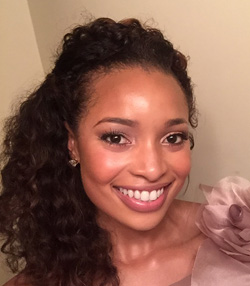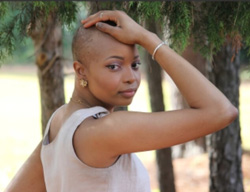While Alexis Corbitt ‘06 has made a career in healthcare, her recent experiences as a patient have opened her eyes to aspects of the industry to which she had previously given little thought.
When Corbitt, a native of the U.S. Virgin Islands, arrived at NC State, her sights were set on becoming a dermatologist. The summer following her freshman year, she participated in Duke University’s Summer Medical and Dental Education Program (SMDEP—now known as the Summer Biomedical Sciences Institute). Through this rotational program she gained exposure to several health specialties, shifting her primary interest to pharmacy; she even worked as a pharmacy technician at Eckerd Drug.
Like many Park Scholars, Corbitt’s curiosity continued to evolve. She took a nutrition course with Dr. Sarah Ash, one of her Park Faculty Mentors, and “fell in love with nutrition.” By the next summer, she was in a lab determining the glycemic index of sweet potatoes. After completing her undergraduate degree, Corbitt remained at NC State for a year to earn a master’s in food science. That year afforded her a new level of self-awareness, however.
“I realized that I did not make a very good ‘lab rat,’” said Corbitt. “I’m too gregarious!”
She shared her concerns with Dr. Brian Farkas, another of her Park Faculty Mentors in the Department of Food, Bioprocessing and Nutrition Sciences. Farkas, who was sporting braces on his teeth at the time, suggested that Corbitt consider becoming an orthodontist. With this advice in mind, Corbitt shadowed Farkas’ orthodontist, a general dentist, and prosthodontist—and found her calling.
“I enjoyed the art, engineering, and healthcare wrapped up into an awesome, service-oriented career with plenty of opportunity for me to be chatty. Perfect!” Corbitt said.
She completed the Medical Education Development program at UNC-Chapel Hill in summer 2006, and was accepted to the UNC School of Dentistry that fall. Highlights of her time as a dentistry student include serving two years as co-chair for the Student Health Action Coalition, a student-run evening dental clinic; providing dental care in St. Croix and St. Thomas as part of her clinic rotation; and a 2008 trip to Africa, during which Corbitt and her classmates visited a dental school in South Africa and volunteered in Malawi, performing many extractions. She found the latter, in particular, to be a humbling experience. Since then, Corbitt has helped provide free dental care in several Mission of Mercy clinics in North Carolina and Washington, D.C.
After completing her residency at the Philadelphia Veterans Affairs Medical Center and a year of private practice, Corbitt was recommended for a position treating homeless veterans at the Veterans Affairs Medical Center in Washington, D.C.
“Hospital dentistry is exciting because of the surgeries I can perform, along with restoring some severely compromised dentition,” she said. On the other hand, “it can be disheartening when some veterans do not qualify for comprehensive care. It’s not easy recommending patients go elsewhere for care.”
In February 2016, Corbitt found herself on the patient side of the healthcare industry. Following a routine breast exam, MRI, and subsequent biopsy, she was diagnosed with Stage IA moderately differentiated invasive ductal carcinoma. She underwent four months of chemotherapy and a double mastectomy with reconstruction—continuing her work all the while, in an effort to maintain sanity and some sense of normalcy.
Thanks to the “stellar” treatment she received at the George Washington University Medical Faculty Practice and the strong support of fellow members of the Young Survival Coalition (YSC), Corbitt is now cancer free.
Before beginning treatment, Corbitt opted to pursue fertility preservation—freezing her eggs. She was alarmed to learn that, although it’s understood that chemotherapy can leave women sterile, fertility preservation is not covered by all insurance companies.
“Having gone through that experience shed a lot of light on the healthcare system we have in the U.S.,” said Corbitt. “My personal goal is to be involved in legislation that requires insurance companies to cover fertility preservation for cancer patients of childbearing age. This will require a great deal of research and networking, but it is important to me. I have spoken with several YSC members who are unable to conceive after having gone through chemotherapy. Some tell me they were not even made aware of the risk!”

With her final surgery behind her, Corbitt is regaining energy and beginning to return to her former three-days-a-week gym regimen. She still volunteers with the Black Pearl Project and Hashtag Lunchbag, organizations in D.C. which provide feminine hygiene products and food, respectively, for homeless women. While she loves spending time at home with her dog, Sheba, Corbitt’s latest “bucket list” pastime is scuba diving during her travels back to the Caribbean. She plans to visit more scuba destinations, such as Belize’s Blue Hole and the Bahamas’ shipwrecks.
Reflecting on her time at NC State, Corbitt cites exposure to a broad range of ideas and experiences as the greatest benefit of the Park Scholarships program. She fondly recalls her class’ Learning Lab I trip to Asheville, where she and her classmates visited both the lavish Biltmore estate and a small, off-the-grid community.
“That was eye opening!” she said. “Being a Park Scholar kept me encouraged that I could make a difference in this world. Park Scholars are such creative, wonderful leaders. I am a better team player and leader because of what I learned while a scholar.”
Up next: Corbitt and Georgia Davis Brown ‘06 are hoping to coordinate a reunion for their Park class. Stay tuned, Class of 2006!
posted 2016.12.30

